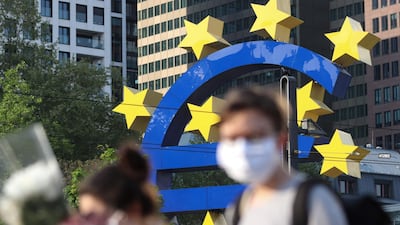The European Central Bank should put ultra-cheap loans at the core of its next stimulus package being prepared for December, Governing Council member Madis Muller said.
Speaking in an interview from Tallinn, the Estonian central bank chief emphasised the need for a renewed so-called TLTRO push rather than additional bond buying via the Pandemic Emergency Purchase Program, saying the situation isn’t like it was in March when the ECB was fighting market dislocation.
“Perhaps PEPP by itself is not the best tool to provide further support, and we should at least think about a combination of different measures,” Mr Muller said. “It’s best if we can find measures that more directly address the financing conditions for the private sector in particular. In that sense, speaking of TLTROs it would be a possible tool that should be on the table.”
President Christine Lagarde said on Wednesday that the ECB will focus on both its €1.35 trillion ($1.6tn) emergency bond purchases and TLTROs -- targeted longer-term loan operations -- for the next wave of stimulus to fight the coronavirus fallout. That was the strongest indication yet about the kind of tools her institution will adopt when it adjusts policy in December.
The ECB has eased the terms of its lending program since the crisis began. Banks can now obtain three-year loans for an interest rate as low as minus 1 per cent -- meaning the ECB pays them to borrow -- as long as they lend the cash onto companies and households.
Financial institutions took up €174.5 billion in loans in September, and a record €1.3tn in the previous round in June. Only two more operations are currently scheduled, in December and March.
Also emphasising the lending environment on Thursday was Bank of France Governor Francois Villeroy de Galhau, who told BFM Business TV that the ECB needs to keep financing conditions that are “very favourable and very predictable.”
Mr Muller declined to speculate about the potential size of the upcoming stimulus, saying it’ll hinge on new economic projections, including the first forecast for 2023.
“It’s too early to say how large the package should be,” he said. “If there are no tensions in the financial markets there is less need for significant further easing of policy.”
The ECB has so far spent around half of the sum earmarked for the emergency bond-buying programme, which is currently set to run until the middle of next year.
The stimulus debate is intensifying after the euro area’s economic outlook darkened considerably in recent weeks. Record-breaking coronavirus cases across the region have forced governments to reimpose some restrictions that mean a stronger-than-expected rebound over the summer months could evaporate into a double-dip recession.
Progress in developing a vaccine against the virus has been very positive but is unlikely to have any real short-term economic impact because of the time it’ll take to become widely available, Mr Muller said. Another quick rebound is unlikely and the recovery will likely be gradual, he added.
“If changes in the projections aren’t that significant, we’ll still have to take into account that the second wave probably was stronger than what we expected at the time of our previous decisions,” he said.
The ECB has pledged to keep its stimulus in place until the crisis is over. Mr Muller reckons that until there is clarity on that front the institution’s emergency tools, rather than its older asset-purchase program, are the right measure to use at present.
“We are clearly in a crisis phase right now,” he said. “Once you’re out of the acute crisis mode, APP is preferable to PEPP.”

